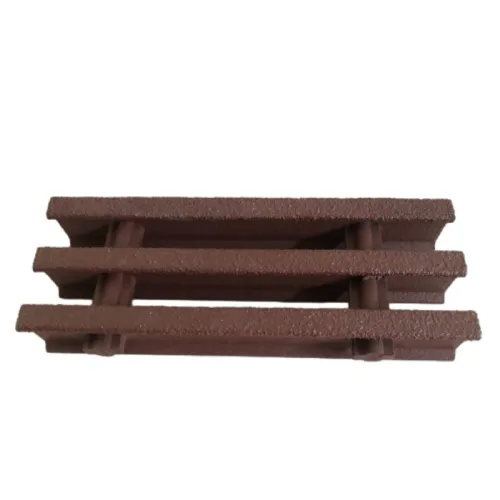loading...
- No. 9, Xingyuan South Street, Dongwaihuan Road, Zaoqiang County, Hengshui, Hebei, China
- admin@zjcomposites.com
- +86 15097380338
- Welcome to visit our website!
modular stair railing systems
The Versatility of Modular Stair Railing Systems
In recent years, the construction and design industries have made significant strides towards modular solutions that offer flexibility, efficiency, and aesthetic appeal. One notable innovation in this realm is the modular stair railing system. These systems provide a modern, customizable alternative to traditional railing solutions, catering to both residential and commercial needs. This article delves into the various benefits, types, and applications of modular stair railing systems.
Understanding Modular Stair Railing Systems
Modular stair railing systems are designed to be easily assembled, disassembled, and adjusted. Composed of pre-fabricated components such as posts, balusters, rails, and connectors, these systems are engineered to fit together seamlessly. This modular approach not only streamlines the installation process but also allows for easy modifications and upgrades in the future.
Benefits of Modular Stair Railing Systems
1. Customization One of the standout features of modular stair railing systems is their customization potential. With a variety of materials, colors, and designs available, homeowners and builders can tailor the railing to suit their unique aesthetic preferences and requirements. Whether one prefers a sleek glass railing, a classic wooden design, or a sturdy metal structure, modular systems can accommodate any vision.
2. Ease of Installation Traditional railing systems often require extensive labor and time to install. In contrast, modular systems are designed for quick assembly. This not only reduces installation costs but also minimizes disruptions during the construction or renovation process. Many manufacturers offer comprehensive instructions and even video tutorials that facilitate a straightforward installation, making them accessible to DIY enthusiasts.
3. Safety Safety is a paramount concern when it comes to stair railings. Modular systems typically meet or exceed safety regulations, featuring durable materials and designs that ensure stability and security. The spacing of balusters and the height of rails can be configured to prevent accidents, making these systems a reliable choice for homes and public spaces alike.
4. Durability Modular stair railing systems are constructed from high-quality materials designed to withstand the test of time. Options like stainless steel, aluminum, and treated wood are resistant to rust, rot, and other forms of deterioration. This durability means that once installed, these railings require minimal maintenance while maintaining their appearance and functionality.
5. Cost-Effectiveness While the initial investment in a modular stair railing system may seem higher than traditional options, the long-term benefits often outweigh the costs. Reduced installation time, low maintenance requirements, and the potential for future adaptability can result in savings that make these systems a wise financial choice.
modular stair railing systems

Types of Modular Stair Railing Systems
Modular stair railing systems come in various types, each catering to specific needs and personal tastes.
- Glass Railings These offer an unobstructed view and a contemporary feel, perfect for modern homes. They are ideal for outdoor patios, balconies, and indoor staircases where aesthetics are a priority.
- Wood Railings For those seeking a warm and traditional look, wooden modular railings provide a timeless aesthetic. They can be painted or stained to match the rest of the home’s interior design.
- Metal Railings Often made from aluminum or wrought iron, metal railings provide strength and durability. They are particularly popular in commercial settings, where safety and longevity are critical.
- Cable Railings A hybrid of glass and metal designs, cable railings comprise stainless steel cables strung between posts. They are increasingly favored for their minimalist look while ensuring an open view.
Applications
Modular stair railing systems are suitable for a wide range of applications. In residential settings, they can enhance the beauty and safety of indoor and outdoor staircases, balconies, and decks. In commercial spaces, these systems can be used in office buildings, shopping centers, and public spaces, ensuring compliance with safety regulations while offering a modern aesthetic.
Conclusion
Modular stair railing systems represent a significant advancement in the world of construction and design. With their ease of installation, customization options, durability, and safety features, these systems cater to the evolving needs of homeowners and builders alike. Whether for personal use or professional applications, investing in a modular stair railing system is a decision that promises both practicality and elegance. As design trends continue to evolve towards flexible and sophisticated solutions, modular systems are poised to lead the way in modern design.
-
The Rise of FRP Profiles: Strong, Lightweight, and Built to LastNewsJul.14,2025
-
SMC Panel Tanks: A Modern Water Storage Solution for All EnvironmentsNewsJul.14,2025
-
GRP Grating: A Modern Solution for Safe and Durable Access SystemsNewsJul.14,2025
-
Galvanized Steel Water Tanks: Durable, Reliable, and Ready for UseNewsJul.14,2025
-
FRP Mini Mesh Grating: The Safer, Smarter Flooring SolutionNewsJul.14,2025
-
Exploring FRP Vessels: Durable Solutions for Modern Fluid HandlingNewsJul.14,2025
-
GRP Structures: The Future of Lightweight, High-Performance EngineeringNewsJun.20,2025
